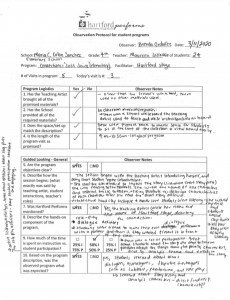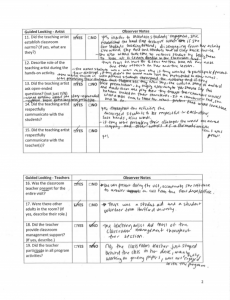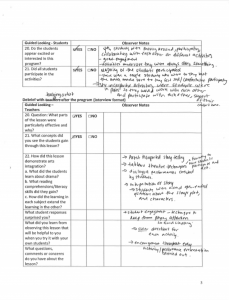Our Methods:
Our research is composed of qualitative data provided by a focus group, classroom observations, and parent interviews. We are collecting this data based on the project that Hartford Performs (HP) presented us: the need for more program observations. This data is needed to know if certain programs are working, to determine how to integrate more programs to older grades, and to see if they need to change anything with current operations. We expanded beyond doing observations with their protocol to the focus group and interviews because we want to provide HP with more options. We chose teaching artists and parents because they offer unique perspectives that HP currently has less data on. Furthermore, we considered the concept of triangulation in expanding beyond doing only observations because we wanted to “build on the principle that we learn more by observing from multiple perspectives than by looking from only a single perspective” (Neuman, 2011: 166).
We designed our focus group/now interview questions based off of our project aims we developed after our meetings with our community partners Jeanika, Rie, and Emily. Once we had our initial questions, we reviewed them in a practice focus group with our faculty partner- Professor Pappas- to revise any questions in need of edits or to cut questions in general. Once we were comfortable with our questions, we commenced with our research.
Teaching Artist Focus Group:
We conducted a focus group with a total of five teaching artists working with HP. We identified participants using purposive sampling. We asked questions about why they believe arts-based education is important, how they create programs, and recommendations for program improvement among others to get a well-rounded view of the role of teaching artists in HP. Follow the link to our focus group transcript.
https://docs.google.com/document/d/1nS-KDz7AOHAqbDEOPwCl9upkSjIrqtN0XIedSGVeCUg/edit?usp=sharing
Classroom Observations:
We observed a total of four HP teaching artists in the classroom. These observations were conduction with different grades and programs to get a wider scene of the programs. We used the observation protocol HP provided us because it informed them of the data points they are interested in. Some of the information includes teacher involvement, student engagement, and program description fulfillment. View these pictures to see one of our classroom observations.



Parent Interviews:
In addition, we conducted three interviews with parents of Hartford students or teachers in the Hartford Public School system. We used a snowball sample to gather our interviewees, following recommendations from the different contacts we had. We asked questions about the importance of arts-based education, their knowledge of arts programs in the Hartford schools, and the impact of the arts with students. Follow the links below to two of our parent interview transcripts.
https://docs.google.com/document/d/1g7zbwQttwouM_AcyeU_PLYcPArCRvpLFXn5iB1eAE-0/edit?usp=sharing
https://drive.google.com/file/d/1xpzH2luOwH48kmW-Y5qdAvObEwqprsHz/view?usp=sharing
Limitations: An Addendum to the Spring 2020 Semester
Our methods of data collection differed from what we originally planned. Due to the closing of the Trinity and Capital from COVID-19, we modified our collection expectations. We were unable to continue classroom observations and needed to cut our plans to hold two more focus groups. To adapt, we conducted phone interviews with parents to continue gathering data after the closings.
